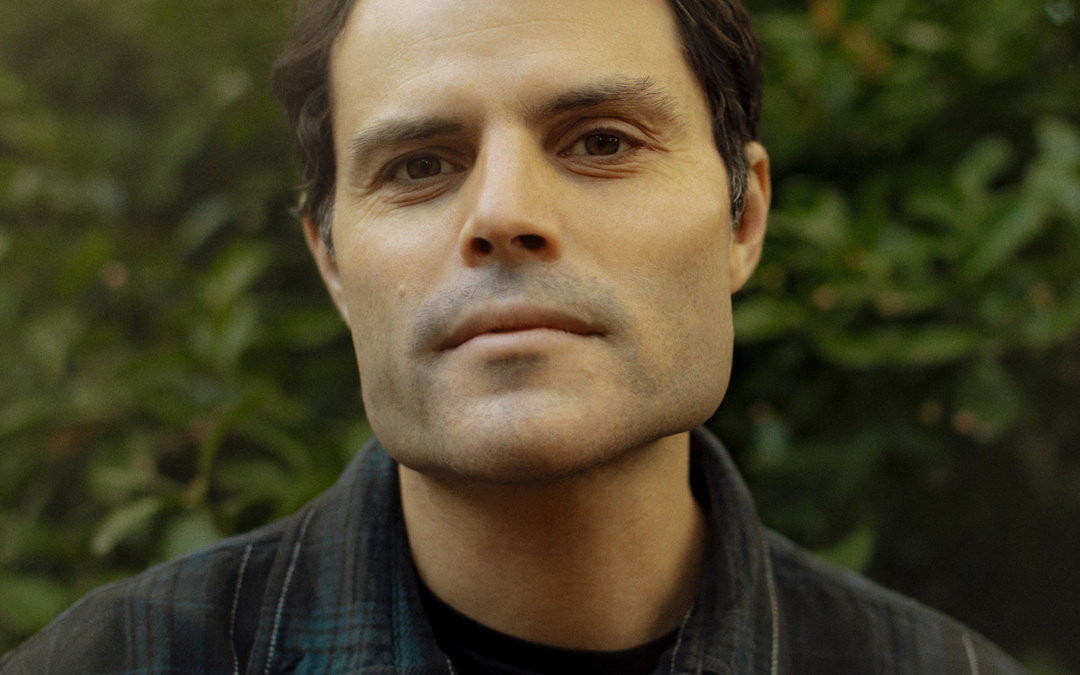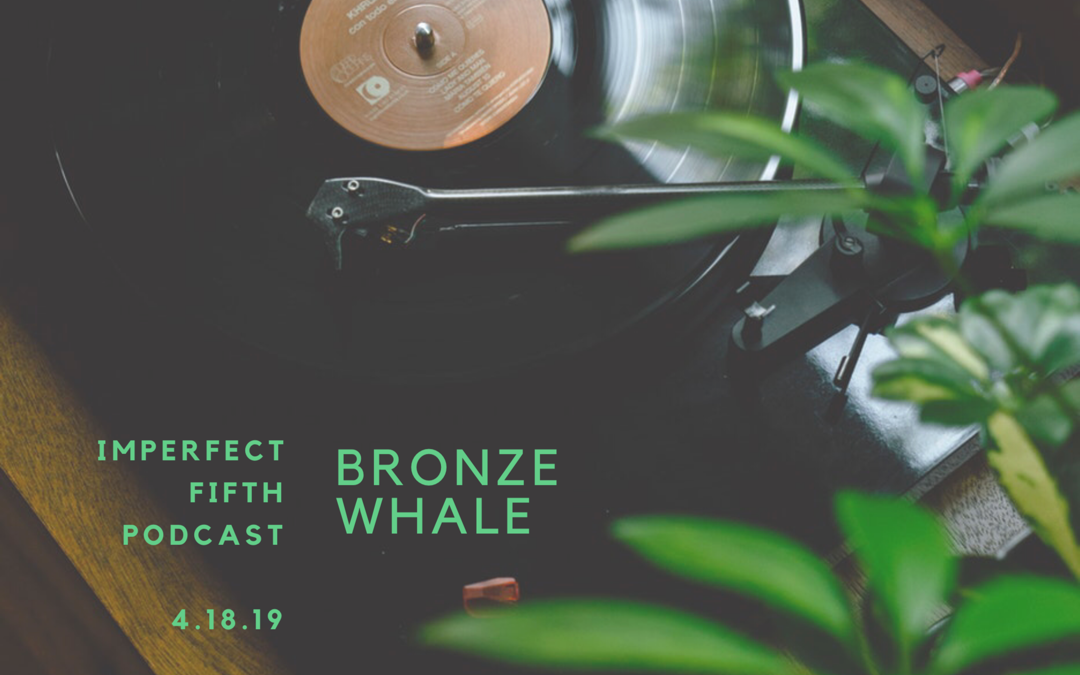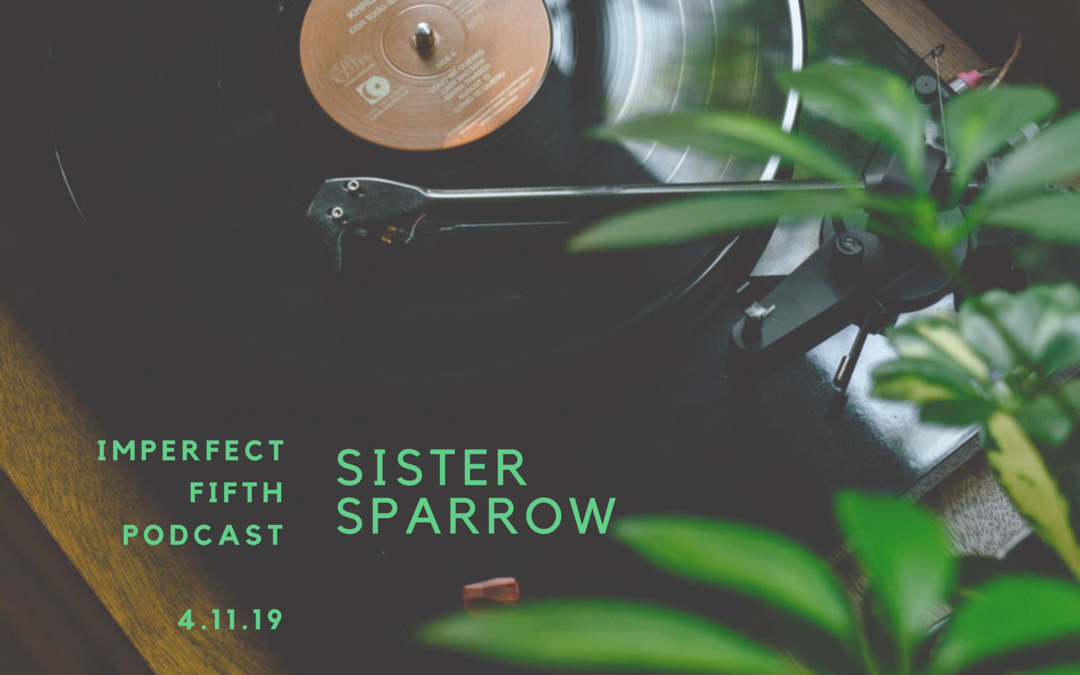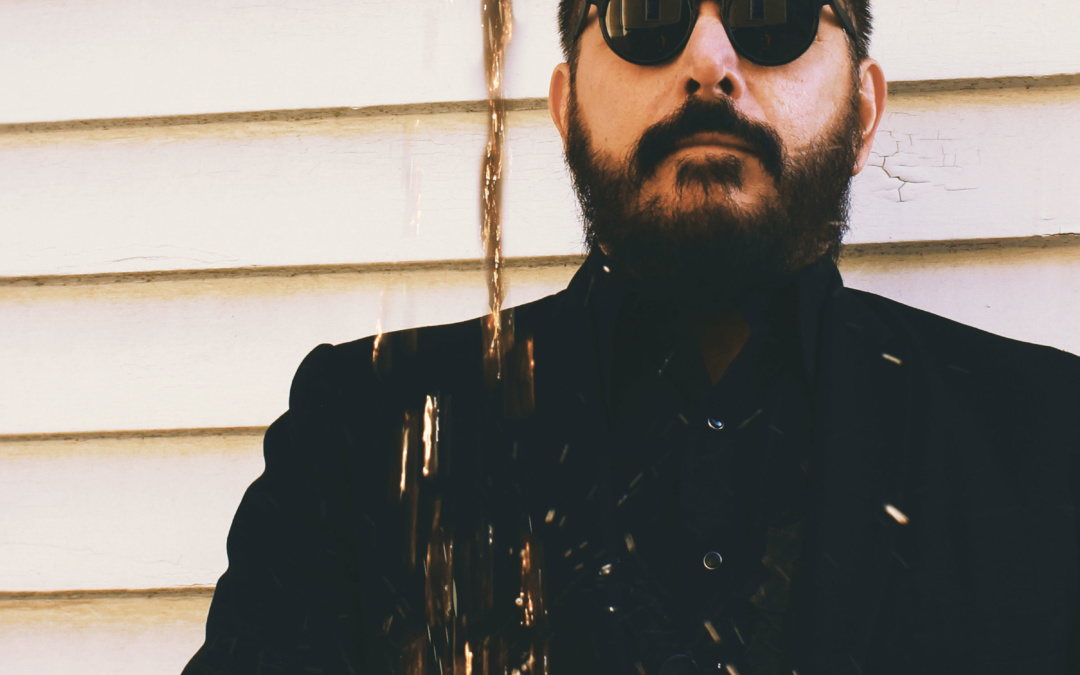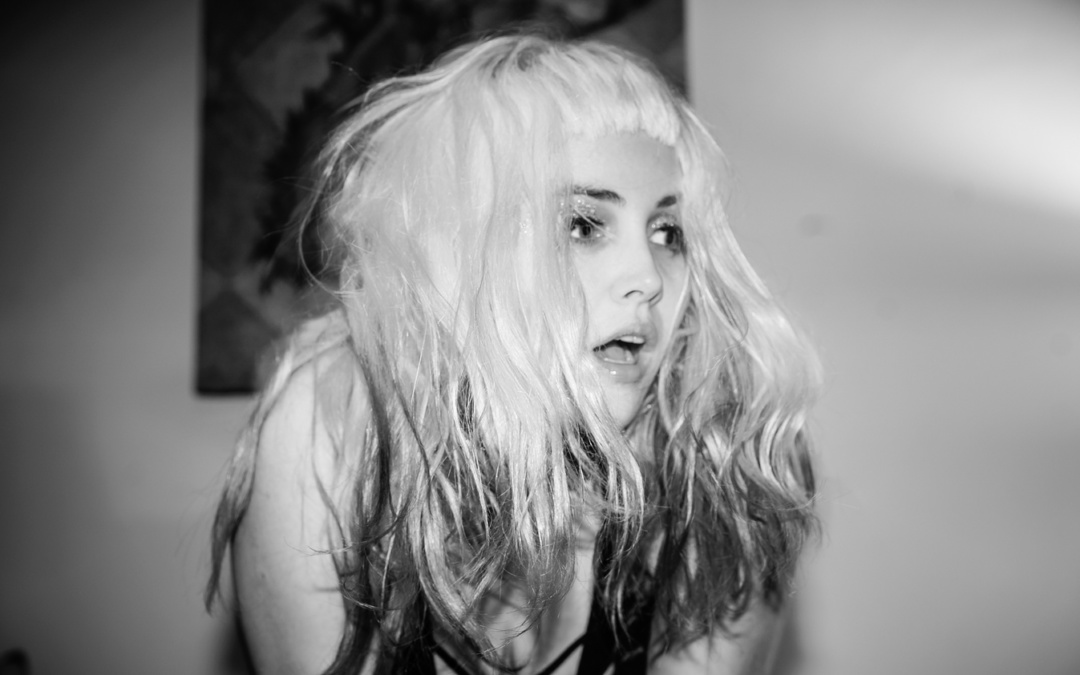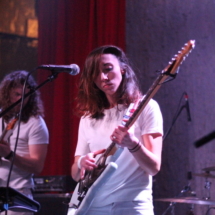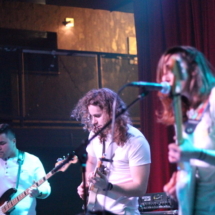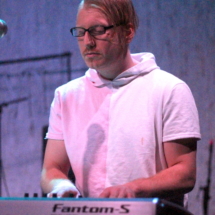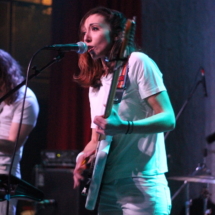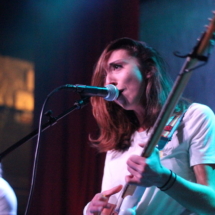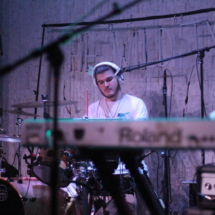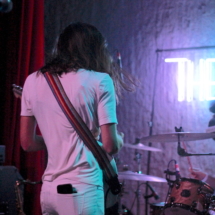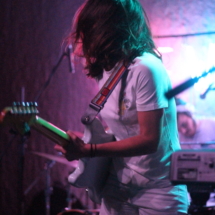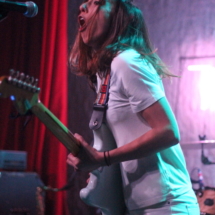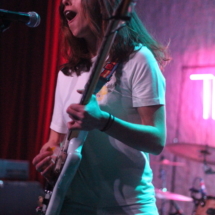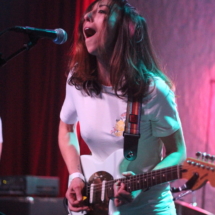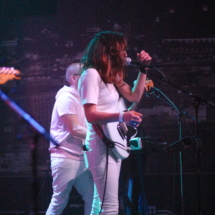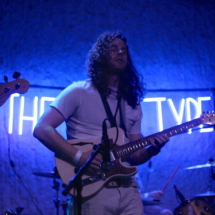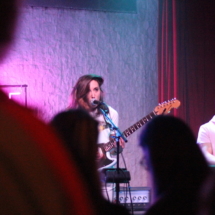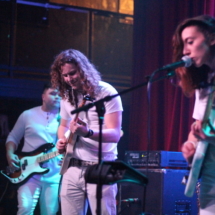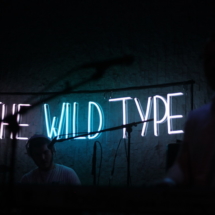
by Madi Toman | Mar 23, 2020 | singles, wolf tracks
Toronto-based artist Elrichman (also known as Paul Elrichman of Ducks Unlimited and Germaphobes) has just released his new single, “I Mostly Consume”, which is from his upcoming sophomore LP, Heaven’s Mayor. The record is the follow up to his 2014 effort, Young, Healthy and Wonderful, and is to be released this summer via Bobo Integral. It features a wealth of Toronto-based talent with Alex Gamble on production duties (Fucked Up, Alvvays) and contributions from Zach Bines (Weaves) and Jon Pappo (Hooded Fang) as well as the Boston-based Anh Phung (Twisted Pine).
Speaking of the track, Paul says: “‘I Mostly Consume’ is about feeling like you exist on this earth mostly to consume, which is the sense I have sometimes. The bridges set scenes of impending doom, but everything else is pretty cheery so I guess I’m a blissful consumer!”
The song is quite bright and poppy for a topic as serious as impending doom, and Elrichman juxtaposes serious topics (the album itself focuses on the notion that we only exist on this planet for the purpose of consuming) with upbeat 80s jangle-pop vibes. Elrichman explores a variety of tempos and strips back mid-tune for a thoughtful instrumental section comprised of piano and strings in the middle of the track before launching back into a high-energy second half for a strong finish.
“I Mostly Consume” is out now on all streaming platforms and Heaven’s Mayor is to be released in summer of 2020 via Bobo Integral followed by a string of North American tour dates.

by Meredith Schneider | Oct 3, 2019 | show review
Next Tuesday, October 8th, join us at the intimate Folly Theater in Kansas City as we welcome The Bacon Brothers on their latest tour, The Shaky Ground Tour. The Philadelphia-based genre-bending collective — comprised of Michael Bacon, Kevin Bacon, Paul Guzzone, Tim Quick, Frank Vilardi, and Joe Mennonna — has been lending their talent to the advancing Americana scene for decades. Though the two namesakes of the act have been making music together for most of their lives, they began to record music with this project in 1995.
So, if you haven’t heard of them yet, then your head is officially under a rock.
The perfect news in all of this? They have been touring pretty heavily as of late and — though originally they were only to come as close as Des Moines to the actual heart of America — added us to the tour a little later in the game, which made our hearts absolutely swoon.
Their latest single “Play!” that was released earlier this summer received critical acclaim and served as the backdrop to hot summer nights at the tail end of our warm months. Just enough of a boogie flare wraps itself in a warm embrace around such a beautiful chord progression, and we’re just so excited to see this one performed live.
Take an evening off and visit these Grammy-nominated musicians on Tuesday evening, October 8th. Tickets are available here.
See you on Tuesday! In the meantime, keep up with the brothers here!

by Phlis | Apr 25, 2019 | 5 to 7
Songwriter and composer Gaby Alter released his latest EP under the moniker Yes Gabriel on Friday, April 19th. His career thus far has included creating music for a variety of placement opportunities, namely Off Broadway musicals, independent films, PBS, NPR, and even Disney. With this new work comes some pretty incredible lyricism, and stunning influence peeks through as well. Read on for more in our interview with Alter.
You have a lot of musical experience, what part of your musical past brings you the fondest memories?
In my late teens and twenties, my friends and I put on a string of rock musicals in a small theatre space under a pizza parlour in Berkeley, California. We would write shows about aliens and zombies and superheroes and perform them while people upstairs ordered pizza and played video games. I got to hear songs I wrote sung by some really talented people, and the audiences–a lot of whom were our parents and friends from high school and their friends–loved the shows. That’s really when I started to write songs more seriously.
Your latest EP was recorded in a friends front rooms, why did you never go into the studio?
Actually it was recorded mostly in my own living room–and full disclosure, I did go to a studio one day to track a string quartet. But to answer the gist of your question, I started out thinking I was making demos that I would later re-record in a studio. At some point, I realized there was an intimacy to the songs which I was capturing with my home recordings, so I felt I didn’t need that extra step. A lot of that came down to what needed to be recorded: most of the songs are built around acoustic guitar and piano parts, which home recording captures pretty well. Drums would have required a studio because they are too complicated to record on your own, but luckily, there were no real drum parts on the album, just loops. Also, recording at home allowed me to avoid making choices under the pressure of time and money.
You had no pre-determined path for the album, it just formed. What does this approach bring to the album in your mind?
Stephen King says not to outline a story ahead of time, but instead to excavate it like a fossil. That way you get something that’s the most truthful and interesting, because you discover the story as you write it. So hopefully my putting one foot in front of the other, rather than having a road mapped out first, helps the listener feel like these songs have an organic cohesion with each other and within themselves.
What elements of musicals lay within your debut EP?
When writing lyrics for a musical, I often use specific details. They make the character singing the lyrics seem like a specific person instead of a generic one. I use those kinds of details in my songs on this album. On “Fall Asleep”, for instance: “Do you still have my shirt/the one with faded letters that didn’t quite fit?/You used to wear it when we went to bed and I’d watch you fall asleep in it.” The listener can picture those specific, visual, intimate details of a relationship, and then hopefully it becomes more real for them.
There are other kinds of story telling I use in the lyrics which I use in musical writing. Like in “Dear To Me”, where the song starts with the beginning of a relationship and ends with what happens afterwards, describing moments and details throughout. It’s a story with a clear beginning, middle and end. Musicals songs often have journeys within them, where a character goes from one place to another emotionally, physically or both. Similarly, these songs trace a journey from falling in love to losing love, often within each song.
That said, these songs don’t sound like my theatre songs musically. The arrangements and mood are quieter, more internal. They’re meant to be listened to on headphones or in your car rather than in a theatre.
There are a lot of details in your lyrics, why put so much details into your lyrics when so many artists keep lyrics simple?
I think I answered that in my last response, so I won’t repeat myself. 🙂
To you why do the elements of folk, electronica and chamber pop work well for you?
The organic sounds of folk and the artificial sounds of electronica sounds go well together because they offer a strong and satisfying contrast. Electronica adds surprise to folk, and can limit the sentimentality or conventionality of a purely acoustic folk sound. I’m drawn to those types of sounds and to artists that combine them–Sufjan Stevens, for instance, is a big influence. And chamber pop – adding orchestral instruments to a pop-style song – is obviously nothing new. The Beach Boys and Beatles did it back in the 60s. I love how much richness orchestral instruments bring to an arrangement. They’re real and alive and have a lot of emotional power.
In your mind what would be the perfect place and time to listen to your new EP?
Driving in the evening when the sky is orange, or late at night. I think the subway, or an airplane would work equally well.
Of all the songs on your debut EP as Yes Gabriel, which song is the most you and why?
I love all my children equally. 🙂 But seriously, this is a hard one to answer. I think they are all very much aspects of me, or who I was when I was wrestling with the things I sing about on the album: longing for someone, trying to understand what love meant when a relationship is over.
What do you feel has been the definitive milestones in your career as Yes Gabriel?
I sent the EP to a friend of mine before it was released, and he literally woke me up at 3 am calling from the west coast to tell me how much he thought it worked. I can’t imagine a better response to the album than that. It let me know that it was really landing emotionally.
What makes Friday a good day to release your EP? Why was April 19th a good time?
I waited too long for certain windows, like late or early in the year, and then I heard March is a bad month to release unless you’re playing SXSW. Also, it’s a dark-hued, internal album, more appropriate to colder weather, so any later in the year and it would seem a little out of place.
Thank you so much for giving Imperfect Fifth this interview, is there anything you would like to add?
Just a small plug for Bandcamp, where you can find my album. They are very fair to artists and support the discovery of new music.
Thanks very much for interviewing me!
Keep up with Yes Gabriel here.

by Meredith Schneider | Apr 18, 2019 | 5 to 7, Featured
On today’s episode, we sit down with electronic musical duo Bronze Whale to talk about their evolution in the industry and the impact they’ve made on their genre. Of course we also carved in some space to talk about Sasquatch and other creatures of myth.
0:00 Intro
0:11 EZVisibility.com
0:22 Dbl-take.com
0:33 imperfectfifth.com/merch
1:03 Aaron Jaques Intro
1:52 Benny Alley Intro
2:49 Beatles, Chopin
3:45 John Denver
5:05 Turntable.FM
7:29 Austin, TX
9:08 Plush
10:53 “Cruising”
16:41 The Shape of Things
19:46 SPLICE sample pack
21:52 Sasquatch
25:34 Aliens
27:37 Flat earth theory vs. Hollow earth
30:02 Alex Jones
___
Keep up with Bronze Whale here.

by Meredith Schneider | Apr 16, 2019 | 5 to 7, Featured
Today, we get the unique pleasure of sitting down with Arleigh Kincheloe, the brainchild of Sister Sparrow & The Dirty Birds. We talk her latest solo album GOLD, growing up in a musical home, and family. She was so much fun to speak with! Trust me, you don’t want to miss this one.
0:00 Intro
0:11 EZVisibility.com
0:22 Dbl-take.com
0:33 imperfectfifth.com/merch
1:02 Arleigh Kincheloe Intro
2:14 Emmy Lou Harris | Bonnie Raitt
5:04 Growing up in a musical home
6:31 Tour life
8:27 Pre show rituals
12:13 GOLD recording process
16:31 “You’re My Party”
17:51 “Ghost”
19:48 Superpowers
23:04 Spring Tour
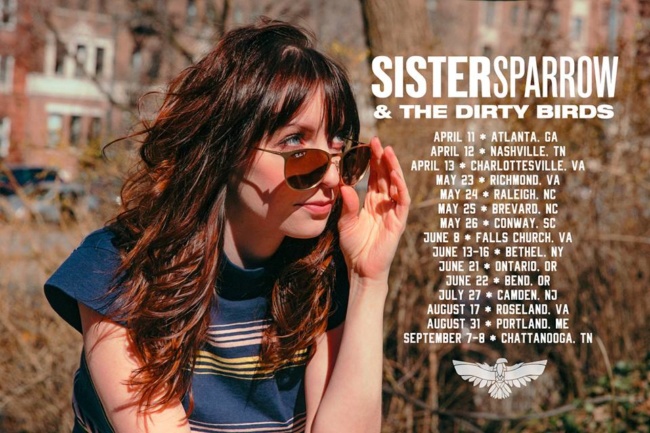
Keep up with Sister Sparrow here.

by Phlis | Mar 28, 2019 | 5 to 7
On April 5th, Drunken Prayer (Morgan Geer) will release his latest full-length, Cordelia Elsewhere. We took a few minutes to chat with him about his evolution as an artist, superstition, and the new album at length. Check it out below!
___
For everyone in Europe we find it hard to grasp the sheer size of the US, as a touring musician when you do a coast to coast tour of the USA just how long does it take and how does the touring experience differ from other countries?
It takes about 5 days to comfortably drive from coast to coast. I’ll be playing maybe 10 shows on the way to the west coast. It’ll take me about 3 weeks to get to LA from Asheville, North Carolina. In that time I’ll be stop in Austin and Albuquerque to rehearse two different groups of musicians for local shows. I could do it faster but on long tours like this it keeps me sane to stop and watch a few sunsets.
You will soon be releasing Cordelia Elsewhere, tell us a little bit about your fifth album.
I had a lot of music but the lyrics were a little shaky. After the 2016 presidential election I found a voice for the record though. This is the closest to a concept record as I’ve done in that regard. Some songs came very quickly, others, like “Rubble and Dust”, required a little thought. I go down a lot of rabbit holes lyrically and have to reel myself in sometimes.
Superstition forms part of the background behind Cordelia Elsewhere, why did you choose superstition as part of the basis of the album?
I’m not sure I consciously chose any superstitious themes. I brood on what lies behind the veil and the unexplained so it’s natural that what I write about. Some of those rabbit holes are filled with me writing without thinking and reflecting afterwards.
There are certain places in the world where superstition is something very big and they truly believe the tales, do you have a certain favourite superstition?
I think wet bread is bad luck.
I come from an Irish Catholic family – apparently you’re supposed to bury a statue of St. Joseph upside down in your yard, under the for sale sign, if you want to sell your house.
They say you should never meet your heroes, but what was it like when you met one of yours Tom Waits?
I wanted to throw up. It was surreal because it came at a time when I was listening to him more than usual. Whenever we talked I would walk away nauseous. I’ll never forget the way my name sounded coming out of his mouth. It was a peculiar feeling.
Your music keeps to them authentic American roots, what is the importance to you of keeping those roots imbedded in your music?
I don’t know that it is that important. Neither is speaking English but it’s what I know. Coming from a musical family that veers toward traditional jazz, country and blues, it’s a familiar voice that comes naturally. I try to stay insulated without isolation. It keeps me open but grounded. When I allow myself to follow every whim I turn into a gross mess.
Why have you decided to have the homesick theme in some of your songs, what makes you so good at conveying these feelings?
I grew up a little lonely sometimes. I was the only child of a single working mother and we moved around a lot. That left me with competing feelings of restlessness and a desire for a forever home. I identify with sad songs.
Why do you feel that Cordelia Elsewhere is your strongest album as Drunken Prayer to date?
It was recorded by a gifted engineer, Brian Landrum, and mixed by the great Mitch Easter from Let’s Active. We played the songs one after the next in a one room backyard studio with only necessary overdubs. The songs on this one came pretty easily all in all as well. That’s usually a decent barometer. When I have to labor too hard over something, it usually sounds fussy. I don’t think it’s a cluttered record.
The whole way in which artists make music and how people buy and listen to music has changed drastically technologically both for the good and the bad. Do you as an artist embrace that technology or do you prefer the older ways, and why?
More and more songs are heard as singles, separated from the album, like the early 45s. That idea has kind of come full circle now that you can upload singles directly to online distributors like CDBaby. I like good sequencing so I tend to buy entire albums, usually vinyl records. Not because they sound better – I’d never know the difference on my cheap system – but I like the machinery and the tactile quality of 12” records and the big art.
Also with the technology comes freedom for you as an artist, long gone is the time when a record label tells you what to do. What do you think are the negatives of this on the music industry as a whole?
There’s a lot more noise to sift through. I use streaming services, especially on tour, but sometimes listening to music in my bubble or personalized playlists gets old. A good radio station is a curator you can trust.
Every place has a different feeling musically, but yet your music is American. Are there certain songs which musically it could come from a certain place in America and if so which songs?
“Four Leaf Clover” started off more as a cajun song. It’s some of the prettiest music there is.
“Rubble and Dust” reminds me of the desert even though it name drops Bend, Oregon. It ended up with what I’d consider a Topanga Canyon sound. That was a happy accident.
Your father and your mother father played Jazz and Dixieland, how has this affected you musically?
For as many generations as anyone can recall, everyone on my mother’s side was some sort of musician. So being a musician of any level of success was an honorable pursuit. There was a point when I thought about maybe going into theology or law but it seemed wrong not to follow the musical wind at my back.
Thank you so much for giving Imperfect Fifth this interview, anything you would like to add?
If you go down to the woods today, you better not go alone.
___
Keep up with Drunken Prayer here.

by ImperfectFifth | Feb 13, 2019 | Featured, perspective
In an era of computer-made, beat-driven music, Grand Canyon is the antithesis of modern pop music. However, by focusing on musicianship and timeless songwriting, and drawing on the inspiration of the classic sounds and arrangements of the 70s, it is the kind of pop music that will be wafting through the canyons for a long time. Here, guitarist Joe Guese shines looks back on a rock legend that inspired his career, as well as countless others.
My journey with Tom Petty began like many others did, with a road trip.
It was the summer of ’92. I was 10, and my family was taking our annual road trip. California was that year’s destination. I had just recently purchased, or more likely my parents purchased, Into the Great Wide Open. We set off on our journey for the west coast. Little did I know then, it would be a road trip for the rest of my life. I put Into the Great Wide Open on my discman, letting it be my soundtrack through the endless canyons and expansive horizons of the west. The music always seemed to have a vision of hopefulness, positivity, and pure rock ‘n’ roll. I picked up the guitar two years later and never looked back.
He provided the soundtrack for my youth. I’ll never forget my first Petty concert at Red Rocks, the soundtrack to high school parties, hearing “Room at the Top” the day Columbine happened, and his music present at many other seminal events in my life. Tom Petty led to some of the best and longest lasting friendships I’ve ever had. Fast forward to the winter of 2002, I had just finished up a rehearsal with my college band who was trying out a new bass player. That bass player was Ethan Mentzer. We decided to make the long walk back from the rehearsal space to the Berklee dorms. On that fateful walk, we discussed our love of Petty, girls, anything rock ‘n’ roll, and more Petty. We would go on to become lifelong friends and start a band that would tour the world. He taught us everything: cool guitars, cool amps, great songs, how to record, and most importantly the attitude and feeling of rock ‘n’ roll music. He was the embodiment of “cool”.
Petty has led me down some pretty strange and wonderful roads. I had the pleasure of playing “Running Down a Dream” with three members of the Heartbreakers and two great friends Jamie Arentzen and Matt Pynn (the Elmbreakers) a couple years ago at a Grammy party. That road also led me to Casey Shea who would also become a lifelong friend. Our mutual admiration of Tom Petty pushed us to start Grand Canyon in our mid 30s. Talk about running down a dream!
So cheers to that summer of ’92 in the back of a suburban, where I’m at now in Los Angeles, wherever that road may lead, to all the bad girls, and those boys who play that rock n roll.
Good fortune comes our way
And we ride down the Kings Highway”
Thanks, Tom, and Rest In Peace.
___
Keep up with Grand Canyon
here.

by Phlis | Jan 29, 2019 | 5 to 7
Southern California-based psych/folk musician Elizabeth le Fey has been making beautiful strides with her music under the moniker Globelamp. We’ve been bedazzled by her presence ever since 2014’s Star Dust entered our lives, and watching that progression has been an absolute pleasure over the years. Luckily enough, we got a few minutes to speak with the masterful le Fey about her music, and we also got a few other fun questions in.
Romantic Cancer is your most stripped down album to date, why did you decide on this for your third release?
I wanted to finally put an album out that sounded closer to how I sound live. When I perform live, I play alone. Although I love experimenting in the recording studio, I thought it would be good for Globelamp to have an album in my discography that was true to what the roots were of my music making – guitar, piano, and me.
You recorded Romantic Cancer in Bohemesphere Studios not far from Woodstock, which is a name synonymous with music. Did any element of Woodstock appear in your music?
Yes I think the elements of Woodstock were in my music even before I went there so it was extra cool to be inspired by the actual location of Upstate NY. Growing up, there is so much mythology around Woodstock that if you are a musician, you probably have romanticized it.
Your new album focuses on how we pull ourselves back together again after a breakup, how would you hope this would help and inspire people who are just going through a breakup?
I hope this album would encourage people to love again even if they have been hurt before. I hope I’m not the only one who relates to the emotional low of “lowest low” haha. I think that sometimes you don’t realize you are romantic until you date someone who is afraid of romance or love. Or maybe you are that person who fears love because of fear of abandonment or hurt. This album could be for either person in that scenario – the hopeless romantic – or the closed off emotional shell who secretly longs for love.
How did Romantic Cancer lead on from The Orange Glow?
The Orange Glow in my mind is more a psychedelic dark forest fairy tale. Romantic Cancer is more of a journal entry exposed.
You are a fan of British folk music of the 60’s, what is it about the music of that era and place that influence you so much?
I think I love the minimalism of it and the raw talent that was around in that time period. Now people can hide behind so many effects in music, it’s hard to tell who is actually creating what. I love the British folk music of the 60’s and how they tell stories and create a whimsical atmosphere with their words and phrasing.
You recorded a few songs on Romantic Cancer in just one take, what was it about the song and the emotion of the song that felt right on the first take?
I think it’s because I had practiced the songs so many times and envisioned how they should sound so it was easy to just bust some of the songs out. Of course people recording with you always want to add more, but in my mind, I already knew what some of these songs sounded like and I had a very clear vision of it. There is something powerful in recording one take of a song when you just KNOW you got it.
Why was love such an important subject for your new album?
Because I used to think that showing emotions and being vulnerable was weak but these last few years I realized that it is actually strong to say how you feel – because most of the time people can relate to those things the most. We all know what it feels like to fall in love or get our heart broken.
James Felice joined you on Romantic Cancer, what was it like to work with him as you are a fan of his music?
It was amazing and a total honor. I am a huge fan of the Felice Brothers and I think James Felice is so talented and he is also a sweetheart. I love the additions he added to the album. I can’t even imagine “Blinded” or “Black Tar” without him now.
When you wrote “Blinded” you wanted it to have a synth-pop sound, now I’m a big fan of synth-pop so what bands would have influenced you?
Hmmm I’m not really sure. 80’s stuff and the song “I wish You would” by Taylor Swift. Kinda a random answer but the backup vocals on I wish you would made me want to write a song like that (didn’t happen) but I kept imagining the vocals on “blinded” going “you and me you and me” over and over again the way Taylor goes, “I Wish I I I wish I II wish II I wish you would”
You speak a little bit of German and have visited Germany, what is it about Germany that is so magical or draws you there?
I guess their creepy history and the actual land, it feels magical. Growing up I always thought German was the ugliest language and had no desire to visit Germany, but after being there, I changed my mind. My uncle is a professional trumpet player in the Bonn Symphony Orchestra so I have had the pleasure of spending a good chunk of time in the country. I have always been fascinated by fairy tales and the Grimm’s fairy tales are German. When I was a student at The Evergreen State College I also took a course called “Blood and Beauty; the study of Germanic paradoxes of their love of mystery and order”. It was a really intense class. I love how Germany is helping the refugees from Syria, especially with the German’s dark past. My uncle has a whole Kurdish family from Syria living with him. They have their own house on his property. I feel very blessed that I was able to become such good friends with the Kurdish family. Since none of them could speak English, I had to get better at German. I actually wrote a song about them, and refugees in general, that I cut from Romantic Cancer. It didn’t fit the theme and I plan to put on the next album.
What do you feel is your most ethereal song you have ever written?
Wow hard question. I guess it matters if I am performing it or listening to a recorded track. Faerie Queen?
What do you feel are the most important elements of your music?
The feelings, the words.
____
Keep up with Globelamp here.

by Meredith Schneider | Dec 20, 2018 | snapshot, visual
On Friday, December 14th, Rachel Mallin & The Wild Type opened for the incredible Bad Bad Hats are recordBar in Kansas City, MO. We were on the ground to get some photos, and here are some highlights from their particularly groovy set.



